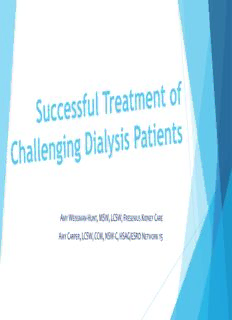
amy weissman-hunt, msw, lcsw, fresenius kidney care amy carper, lcsw, ccm, nsw-c, hsag/esrd ... PDF
Preview amy weissman-hunt, msw, lcsw, fresenius kidney care amy carper, lcsw, ccm, nsw-c, hsag/esrd ...
AMY WEISSMAN-HUNT, MSW, LCSW, FRESENIUS KIDNEY CARE AMY CARPER, LCSW, CCM, NSW-C, HSAG/ESRD NETWORK 15 Our Objectives Through lecture and a question and answer session event attendees will participate in learning and sharing on the topic of “Successful Treatment of Challenging Dialysis Patients.” At the end of the learning session attendees will be able to: Implement strategies to overcome challenges when working with behaviorally challenged patients Demonstrate approaches in working with patients who have substance abuse or mental health issues that create an environment of support and success Integrate knowledge in individual dialysis settings to address individual culture and patient needs. Integrate strategies with dialysis team members encouraging the entire dialysis team to create a culture of success Identify the Centers for Medicare and Medicaid Conditions for Coverage regulations related to reassessment and interventions to avert any and all possible Involuntary Discharges. Empower staff to utilize approaches that allow each team member to feel equipped to appropriately interact in situations with difficult patients The Clinical Setting: Working With Challenging Patients Amy Weissman-Hunt, MSW, LCSW Arizona Regional Lead MSW, Social Work Advisory Board Fresenius Kidney Care. Defining Behaviors that are Considered Challenging to Dialysis Units Verbal or Written Abuse: Use of words, written or spoken, that demean, insult, belittle or degrade a person. Verbal or Written Threat: Use of words, written or spoken, expressing intent to harm, abuse, or commit violence toward a person or the facility. Physical Threat: Gestures or actions expressing intent to harm, abuse or commit violence toward a person or the facility. Physical Harm: Any injury or attack upon a person or the facility. Property damage/theft: Theft or damage to property on premises of the dialysis facility. Disruptive Patient Behavior and Use of Behavioral Agreement Policy Clinical Services Integrated Policy and Procedure Manual ©2012, Fresenius Medical Care Holdings, Inc. All Rights Reserved. Step 1: Finding our Empathy and Compassion Loss of Dignity Our patients want you to understand their fears Helplessness Remembering a time you felt any of Fear these feelings can guide you in how Feeling alone you treat others who are feeling this way. The unknown Dependent on others Feeling vulnerable To have felt insensitivity, is to be more kind To have faced fear, is to recognize it in the eyes before you And to have fought to live, is to know how fragile life can be. https://www.youtube.com/watch?v=1e1JxPCDme4 Activities Relationships PrPer eE SERSDRD ESRD ESRD Finances Body Use and Image Time What is Normal? Finding our New Normal Not feeling well. Needing Dialysis Treatment Daily Schedule and Activities Work Responsibilities Loss of Control of Life Familial Responsibilities Adjustment Stress What else can contribute to difficult behaviors? Active Mental Health Diagnosis / History SMI, Phobias, Depression, Schizophrenia, Bipolar Disorder, Anxiety or Panic Disorders, Personality Disorders Adjustment Issues Active Substance Use / Abuse Domestic Violence / Hx Dysfunctional Relationships Developmental / Cognitive Impairments Dementia/ Alzheimer's Physical Illness External Stressors Mental Health Impact on behaviors related to Mental Health Issues How does their diagnosis create a potential barrier for treatments Remember to avoid labeling Understand what are triggers for the patient’s unique mental health needs Work with the SW, MD, CM and CN on plans for working with that patient that will meet their unique needs Adjustment Can look like anxiety or depression Not everyone adjusts at the same speed Not everyone expresses their feelings the same There is a lot of control lost when you are on dialysis Loss of control increases fear, anxiety and stress This will increase risk of low resiliency
Description: